
MUSIC PERCEPTION
Scope & Guideline
Advancing Understanding Through Auditory Insights
Introduction
Aims and Scopes
- Cognitive Mechanisms in Music Perception:
Research focused on the cognitive processes involved in music perception, including memory, attention, and the neural underpinnings of how music is understood and enjoyed. - Emotional Responses to Music:
Exploration of how music evokes emotional responses and how these responses vary across different contexts, genres, and individual differences. - Cross-Cultural Perspectives:
Studies examining how music perception and cognition vary across different cultures, including the role of cultural background in shaping musical experiences. - Interdisciplinary Approaches:
Integration of findings from psychology, neuroscience, music theory, and education to provide a holistic understanding of music perception. - Impact of Musical Training and Expertise:
Investigating how various levels of musical training influence perception, cognition, and emotional engagement with music.
Trending and Emerging
- Neuroscience of Music:
An increasing number of studies are employing neuroimaging and electrophysiological techniques to investigate the brain's response to music, highlighting the biological underpinnings of musical perception. - Artificial Intelligence and Music:
Research exploring the role of artificial intelligence in music creation and perception is gaining traction, reflecting broader technological advancements and their implications for music cognition. - Music and Emotion Regulation:
There is a growing interest in how music is used as a tool for emotional regulation and wellbeing, particularly in clinical settings, indicating a practical application of music perception research. - Crossmodal Perception Studies:
Emerging studies are increasingly examining how music interacts with other sensory modalities, such as visual and olfactory perceptions, to create a more comprehensive understanding of multisensory experiences. - Social and Cultural Influences on Music Perception:
Research focusing on the impact of social contexts and cultural backgrounds on music perception is on the rise, underscoring the importance of sociocultural factors in shaping musical experiences.
Declining or Waning
- Traditional Music Theory Analysis:
There has been a noticeable decline in studies focusing solely on traditional music theory analysis, suggesting a shift towards more empirical and experimental methodologies in understanding music perception. - Static Models of Musical Emotion:
Research utilizing static models to analyze emotional responses to music is less prevalent, indicating a move towards dynamic and contextual models that account for variability in emotional experiences. - Historical Musicology:
While still an important field, traditional historical musicological studies seem to be waning in favor of contemporary and applied research focusing on current music practices and perceptions.
Similar Journals
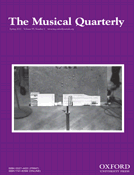
MUSICAL QUARTERLY
Navigating the Evolving Landscape of Music StudiesMUSICAL QUARTERLY, published by Oxford University Press Inc, is a distinguished journal in the field of music, with a publication history that stretches back to 1915. This esteemed journal, identifiable by its ISSN 0027-4631 and E-ISSN 1741-8399, provides a critical platform for scholarly discourse, analysis, and research in musicology and related disciplines, facilitating an understanding of both historical and contemporary musical practices. Although it operates without open access, it continues to attract a diverse readership of researchers, educators, and students alike, thanks to its well-curated articles and reviews that engage with music theory, history, and ethnomusicology. With a current Scopus rank of #119 out of 180 in the Arts and Humanities category and a 34th percentile ranking in Music, MUSICAL QUARTERLY plays a vital role in advancing knowledge and fostering collaboration within the music academic community. Its commitment to high-quality scholarship is reflected in its ongoing efforts to address the evolving landscape of music studies, making it an essential resource for anyone serious about exploring the rich tapestry of music scholarship.

MUSIK IN BAYERN
Connecting Scholars to Bavaria's Musical LegacyMUSIK IN BAYERN is a distinguished journal devoted to the study of music within the rich cultural context of Bavaria, published by HANS SCHNEIDER. With the ISSN 0937-583X, this publication serves as an essential resource for researchers, professionals, and students interested in the historical and contemporary musical landscape of the region. Spanning topics from traditional Bavarian folk music to modern interpretations, the journal aims to foster a deeper understanding and appreciation of Bavarian music in a global context. Although the journal's coverage in Scopus has been discontinued, it remains an essential platform for scholarly communication and analysis in music studies. While MUSIK IN BAYERN operates under a subscription model, it continues to hold significance as an intellectual resource for advancing research in musicology.
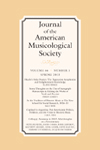
JOURNAL OF THE AMERICAN MUSICOLOGICAL SOCIETY
Pioneering insights in the art of music.JOURNAL OF THE AMERICAN MUSICOLOGICAL SOCIETY, published by University of California Press, is a prestigious peer-reviewed journal dedicated to advancing the field of musicology. With an ISSN of 0003-0139 and E-ISSN 1547-3848, this journal has been a cornerstone of scholarly communication since its inception in 1970 and continues to be relevant through 2024. Its esteemed standing is reflected in its Q2 ranking in the Music category and a respectable 71/180 ranking in the Arts and Humanities discipline, placing it in the 60th percentile among its peers. The journal provides an essential platform for researchers, professionals, and students to explore diverse topics in musicology, ranging from historical studies to contemporary analyses. While it does not currently offer Open Access options, its rigorous editorial standards ensure the publication of high-quality research that contributes significantly to the academic dialogue in music studies. With its address based in the United States at 155 Grand Ave, Suite 400, Oakland, CA 94612-3758, the journal remains a vital resource for those seeking to deepen their understanding of the complexities of music and its societal impacts.
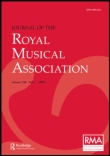
JOURNAL OF THE ROYAL MUSICAL ASSOCIATION
Bridging traditional and contemporary musicology.JOURNAL OF THE ROYAL MUSICAL ASSOCIATION, published by Cambridge University Press, stands as a significant repository for innovative research and scholarly discourse within the field of music studies. Recognized for its contributions to the understanding of musical practices, theory, and history, this esteemed journal offers a platform for academics and researchers to disseminate their findings to a broad audience. With an ISSN of 0269-0403 and E-ISSN of 1471-6933, the journal has maintained a notable presence since its inception, merging insights from both traditional and contemporary musicology. It currently occupies a Q4 ranking in Music within the Scopus database, reflecting its inclusion within the arts and humanities landscape. While the journal traditionally operates under subscription access, its continuing commitment to advancing music scholarship ensures that it remains an essential resource for students, scholars, and practitioners alike, fostering greater understanding and appreciation of musical artistry from 1987 to the current era.
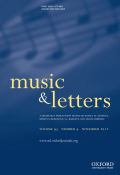
MUSIC & LETTERS
Exploring the Harmony of Sound and TextMUSIC & LETTERS, published by Oxford University Press, is a prominent academic journal that has been at the forefront of musicology and music studies since its inception in 1920. With an ISSN of 0027-4224 and an E-ISSN of 1477-4631, the journal provides a platform for scholarly articles that explore the rich interplay between music and literature, contributing significantly to the understanding of musical context, form, and societal impact. As of 2023, it holds a respectable Q3 rank in Music within its category, positioned at Rank #66 out of 180 in the Scopus Arts and Humanities Music category. Despite not being an Open Access journal, its rigorous peer-review process and commitment to high-quality research make it an essential resource for researchers, professionals, and students alike. The journal's scope encompasses various genres and historical periods, ensuring a comprehensive examination of music's role in culture and community, thereby enhancing the scholarly discourse within this vibrant field. Based in the United Kingdom, at Great Clarendon St, Oxford OX2 6DP, England, MUSIC & LETTERS continues to inspire and inform the global music scholarly community.
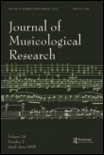
JOURNAL OF MUSICOLOGICAL RESEARCH
Celebrating the Intersection of Music and AcademiaJOURNAL OF MUSICOLOGICAL RESEARCH, published by Taylor & Francis Ltd, is an esteemed platform that delves into the field of musicology, contributing to the ongoing dialogue in music research and scholarship since its establishment in 1979. With an ISSN of 0141-1896 and an E-ISSN of 1547-7304, this journal serves as a vital resource for researchers, professionals, and students, offering insights into diverse musicological topics. Although currently categorized in Q4 in Music with Scopus rankings placing it at #110 out of 180 in the Arts and Humanities field, its commitment to excellence and broader discourses in music studies is evident. The journal does not have Open Access options, yet it provides accessible content through reputable academic channels, fostering scholarly exchanges within the community. It aims to publish high-quality research that advances understanding of musical practices and cultural implications, making it a critical resource for those passionate about music and its myriad influences.

Resonancias
Empowering Scholars to Resonate Beyond Borders.Resonancias is a distinguished open-access journal published by the Pontificia Universidad Católica de Chile, dedicated to advancing the field of music studies. With an ISSN of 0717-3474 and an E-ISSN of 0719-5702, this journal has been promoting scholarly discourse in music since its transition to open access in 2014. Resonancias serves as a critical platform for researchers, professionals, and students alike, enabling them to disseminate knowledge and explore innovative perspectives in musicology. With its current Q2 ranking in the field of music as of 2023, and a Scopus ranking of #108 out of 180, this journal exemplifies its commitment to quality and impact within the academic community, fostering an accessible database of music research from Chile and beyond. Situated at AVENIDA VICUNA MACKENNA 4860, MACUL, SANTIAGO, CHILE, Resonancias not only promotes original research but also includes critical reviews, interviews, and essays that contribute to the rich tapestry of musical knowledge.

OR SPECTRUM
Pioneering Insights for Tomorrow's Business LeadersOR SPECTRUM, published by SPRINGER, is a premier journal in the fields of Business, Management, and Operations Research, with a distinguished reputation established since its inception in 1979. As of 2023, it holds an impressive Q1 ranking in Business, Management and Accounting (miscellaneous) and a Q2 ranking in Management Science and Operations Research. The journal, which is indexed under ISSN 0171-6468 and E-ISSN 1436-6304, boasts a significant impact factor within its scope, making it a pivotal resource for cutting-edge research and theoretical developments. With access options that favor traditional subscriptions, OR SPECTRUM offers a robust platform for the dissemination of innovative ideas and methodologies, vital for academics, professionals, and students alike. The journal's commitment to excellence ensures its critical role in enhancing the understanding and application of operational research techniques around the globe.
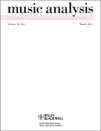
MUSIC ANALYSIS
Unlocking the Secrets of Musical InfluenceMUSIC ANALYSIS, published by WILEY, is a prestigious journal in the field of musicology, recognized for its critical contributions to the analysis of music and its myriad influences on culture and society. With an ISSN of 0262-5245 and an E-ISSN of 1468-2249, this journal has established itself as a vital resource for researchers, professionals, and students alike, boasting a Q1 ranking in the 2023 category of Music. As part of a highly competitive field, it ranks 70th out of 180 in the Arts and Humanities Music category on Scopus, positioning it within the 61st percentile. MUSIC ANALYSIS serves as an essential platform for innovative research and insightful discourse, engaging with musical theory, practice, and education from 1996 to 2024. Its commitment to fostering rigorous scholarship makes it indispensable for those seeking to deepen their understanding of music and its analytical frameworks. Although it does not offer Open Access options, its relevance and impact in the genre ensure accessibility through institutional subscriptions and university libraries.
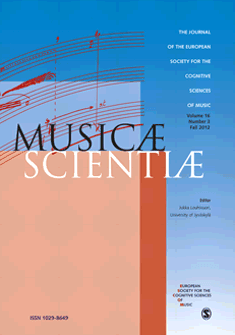
MUSICAE SCIENTIAE
Exploring the Harmony of Music and MindMUSICAE SCIENTIAE, published by SAGE Publications Ltd, is a prestigious interdisciplinary journal situated at the intersection of music and psychological studies. Established in 1997, this journal has garnered an impressive reputation, as evidenced by its 2023 Scopus rankings, where it ranks #2 in Music (Arts and Humanities) and #51 in Experimental and Cognitive Psychology. With a considerable impact factor and categorized in the Q1 and Q2 quartiles, it stands as a key resource for researchers, students, and professionals interested in the cognitive processes related to music engagement and its applications. Although it does not operate under an open access model, MUSICAE SCIENTIAE provides valuable insights and empirical studies that contribute to the ever-evolving understanding of music's impact on human behavior and cognition. By fostering a robust platform for scholarly dialogue, this journal continues to significantly influence research and practice within its fields.